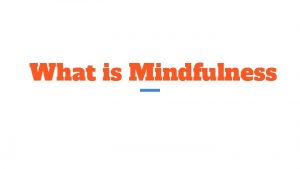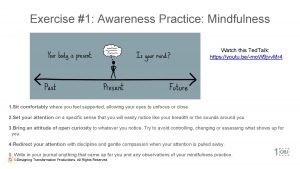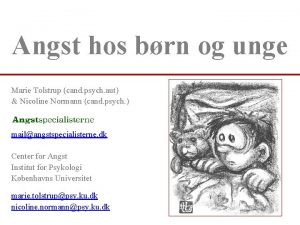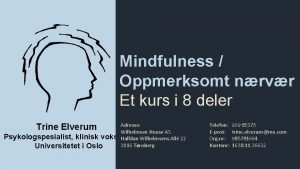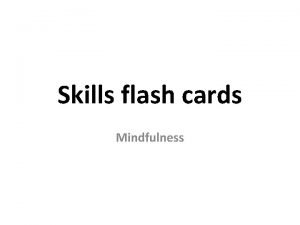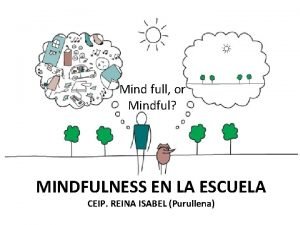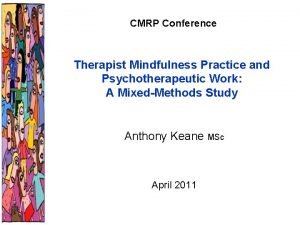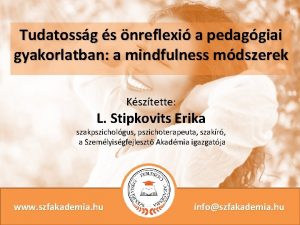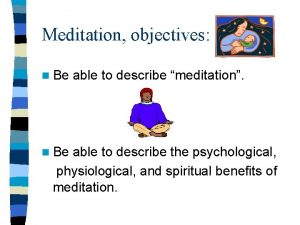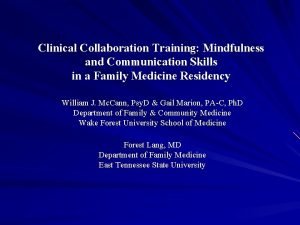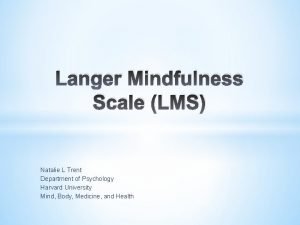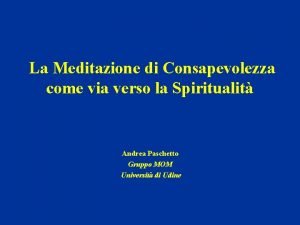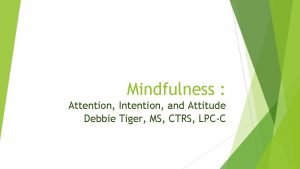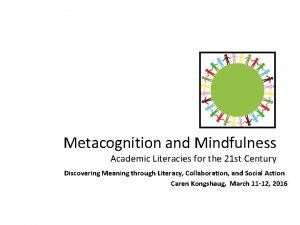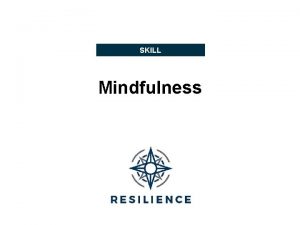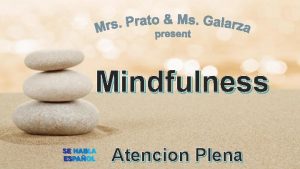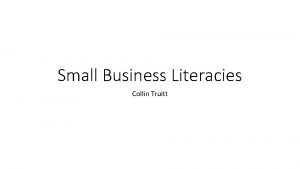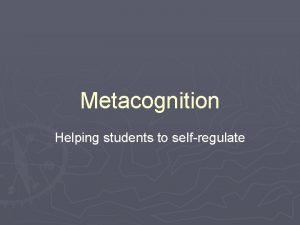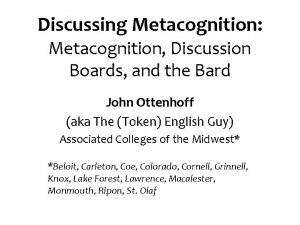Metacognition Mindfulness Academic Literacies for the 21 st

![Reading Apprenticeship Dimensions • • Social [ Act One ] Cognitive [ Act Two Reading Apprenticeship Dimensions • • Social [ Act One ] Cognitive [ Act Two](https://slidetodoc.com/presentation_image_h2/5384c97e85c3c03cdab9368b39c0aff0/image-2.jpg)












- Slides: 14

Metacognition & Mindfulness: Academic Literacies for the 21 st Century A Regional Reading Apprenticeship Conference March 11 -12, 2016
![Reading Apprenticeship Dimensions Social Act One Cognitive Act Two Reading Apprenticeship Dimensions • • Social [ Act One ] Cognitive [ Act Two](https://slidetodoc.com/presentation_image_h2/5384c97e85c3c03cdab9368b39c0aff0/image-2.jpg)
Reading Apprenticeship Dimensions • • Social [ Act One ] Cognitive [ Act Two ] Personal [ Act Three ] Knowledge Building [ Act Three ] Semantic Assessment Model – S. A. M. Act One: Orientation Act Two: Exploring Tensions and Creating Blueprints and Maps Act Three: Confluence of Inspiration, Imagination, and Poor Reasoning

Reflection Principle: Unpacking Assumptions about Reading and Thinking in Three Acts Act #1 Orientation to Cultural Literacy; Reading, Thinking, and Writing ACT #2 Evaluate the Differences Between Being Skeptical vs. Being Open Minded Orientation to the primary goals of reading, thinking and writing strategies. Collectively we are all in search of… --constructing meaning --developing interpretations --exploring context and cultural assumptions Exploring Tensions in a rehearsal space The space is an invitation for students to join in ongoing conversations evaluating an author’s frame of reference, a working thesis, lines of argument, and burden of proof “In the case of books, the point is not to see how many of them you can get through, but rather how many can get through to” you Mortimer Adler Confluence of Inspiration, Imagination, and Poor Reasoning ACT #3 Skills—should … --be clearly defined --reinforced in rehearsal spaces --linked to the overall learning process Creating Blueprints and Maps allows students to build their own metacognition pathways for future reading habits and strategies, these may include: --evidence logs --chunking texts --reading notes --summarizing Irrational Thinking • Straw Person Argument • Wishful Thinking • False Dilemma Argument • Circular Reasoning • Authority Worship Habits—can … --allow for the ongoing practice of reading— thinking—writing Semantic Assessment Model--SAM Reading Engine version 1. 0 David Ortiz: Cascadia College • Burden of Proof

Reflection Principle: Unpacking Assumptions about Reading and Thinking in Three Acts… ACT One: Social Dimension • Orientation to the primary goals of reading, thinking, and writing. An introduction to developing a “purpose” for the metacognitive activity. • The purpose may be influenced by disciplinary views on thinking, writing, and reading within a specific arrangement of courses…

Balancing Act • Context and Purpose… 01<!DOCTYPE HTML> • 02<html> • 03<body> • 04 • 05 <p>Header. . . </p> • 06 • 07 <script> • 08 alert('Hello, World!') • 09 </script> • 10 • 11 <p>. . . Footer</p> • 12 • 13</body> • 14</html>

Reflection Principle: Unpacking Assumptions about Reading and Thinking in Three Acts Act Two: Cognitive Dimension • Exploring Tensions in a rehearsal space • The space is an invitation for students to join in ongoing conversations evaluating an author’s frame of reference, a working thesis, lines of argument, and burden of proof…

Balancing Act • Exploring the tensions between information and knowledge • In the digital age… --documents follow patterns of “Fixity” --information follow patterns of “Fluidity” • In the digital age… --where do rhetorical messages reside? The Social Life of Information by John Seely Brown and Paul Duguid

Reflection Principle: Unpacking Assumptions about Reading and Thinking in Three Acts Act Two: Cognitive Dimension • Creating Blueprints and Maps • Developing reading guides allow students to build their own metacognition pathway for future readings habits and strategies

Balancing Act • When should you use reading skimming strategies and when should you use strategies of deep analysis?

Reflection Principle: Unpacking Assumptions about Reading and Thinking in Three Acts Act Three: Knowledge Building Dimension • Skills and the habits for using them should be ongoing rehearsals for building knowledge and judgment

Reflection Principle: Unpacking Assumptions about Reading and Thinking in Three Acts Act Three: Personal Dimension • Managing Poor Reasoning Strategies --Straw Person Argument: is a fallacy that promotes substituting a distorted, exaggerated or misrepresented version of a position or fact. --Wishful thinking: is a fallacy that promotes believing in something that is not true but, appears true based on our desire to make it appear to be true

Reflection Principle: Unpacking Assumptions about Reading and Thinking in Three Acts --False Dilemma: is a fallacy that promotes an either/or proposition --Circular Reasoning: is a fallacy that occurs when individuals attempt to prove a claim by pointing to another claim that ultimately is supported by the original claim --Authority Worship: is a fallacy based on someone’s status, wealth, or prestige making claims that are supported by their popularity

Reflection Principle: Unpacking Assumptions about Reading and Thinking in Three Acts --Burden of Proof: is a fallacy promoted by individual making exceptional claims only they can support and defend Good Thinking by Guy P. Harrison

Thank- you Now—Start Building… David Ortiz Cascadia College
 Mindfulness circle
Mindfulness circle Mindfullness ted talk
Mindfullness ted talk Marie tolstrup
Marie tolstrup Ruminering definisjon
Ruminering definisjon Brainpop precision and accuracy quiz answers
Brainpop precision and accuracy quiz answers Physical sensations examples
Physical sensations examples Mindfulness or mind full
Mindfulness or mind full Mindfulness
Mindfulness Mindfulness gyerekeknek
Mindfulness gyerekeknek Mindfulness-based stress reduction
Mindfulness-based stress reduction Describe meditation
Describe meditation Mindfulness for collaboration
Mindfulness for collaboration Langer mindfulness scale
Langer mindfulness scale Franco fabbro
Franco fabbro Intention attention attitude
Intention attention attitude
